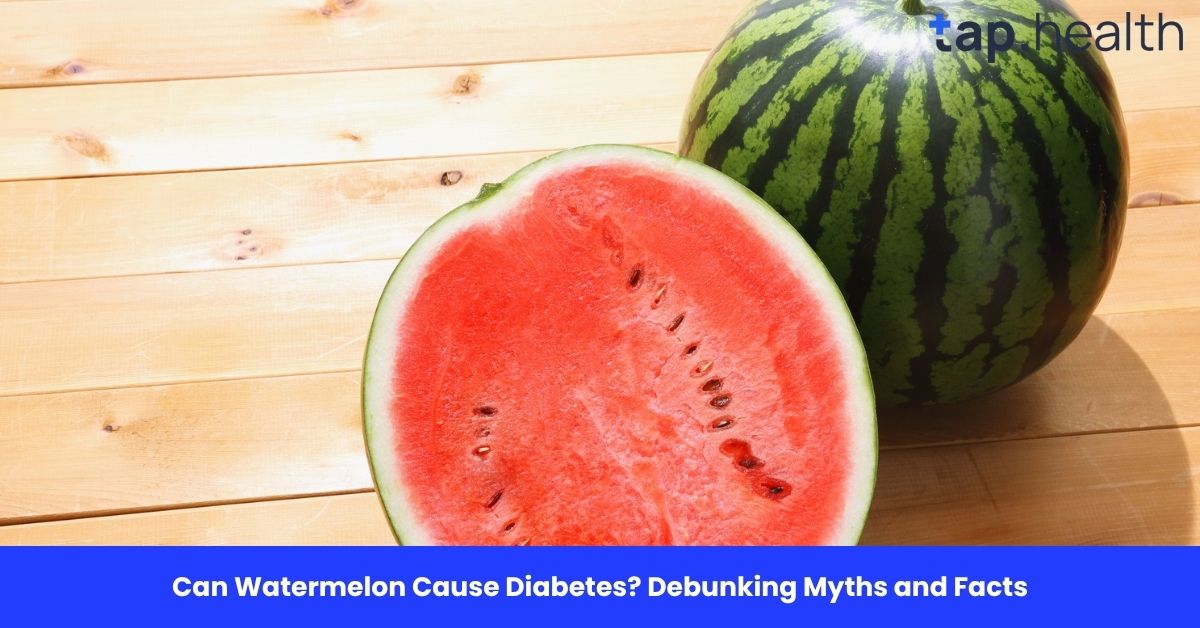Watermelon, with its refreshing taste and high water content, is a summer favourite for many. But if you’re concerned about diabetes, you might wonder: Can watermelon cause diabetes? It’s a common misconception that consuming certain fruits, especially those high in sugar, can directly lead to diabetes. This article will clarify whether watermelon, a fruit loved for its natural sweetness and low-calorie content, can contribute to the development of diabetes, how it affects blood sugar, and what the science says.
Understanding Diabetes
Before diving into whether watermelon can cause diabetes, it’s essential to have a clear understanding of diabetes, especially type 2 diabetes. Diabetes is a condition where the body either doesn’t produce enough insulin or becomes resistant to it, leading to high blood sugar levels. Over time, this can cause serious complications, such as heart disease, kidney damage, and nerve problems.
Type 2 diabetes, the most common form, is largely influenced by lifestyle factors, including diet, physical activity, and body weight. While genetics also play a role, poor diet choices—such as consuming too much sugar or refined carbohydrates—can increase the risk of developing type 2 diabetes.
Does Watermelon Cause Diabetes?
In short, no, watermelon does not cause diabetes. However, like with any food, it’s important to consider how watermelon affects blood sugar levels, especially for individuals who already have diabetes or are at risk of developing it.
Watermelon is a natural fruit that contains natural sugars like fructose and glucose, which do impact blood sugar. However, watermelon has several properties that make it a relatively safe option for most people, including diabetics, when consumed in moderation.
Watermelon and Its Nutritional Profile
To understand how watermelon fits into a diabetic-friendly diet, let’s first take a look at its nutritional profile. Watermelon is mostly made up of water (about 90%), which makes it a low-calorie and hydrating food. It also contains a small amount of sugar but is low in fat and protein.
Nutritional Breakdown of Watermelon (per 100 grams):
- Calories: 30
- Water content: 90%
- Carbohydrates: 7.6 grams
- Sugar: 6.2 grams
- Fibre: 0.4 grams
- Protein: 0.6 grams
- Vitamins and minerals:
- Vitamin C: 8.1 mg (about 10% of the daily requirement)
- Vitamin A: 28 µg
- Potassium: 112 mg
- Magnesium: 10 mg
Watermelon’s Glycaemic Index (GI) and Glycaemic Load (GL)
One of the key concerns for diabetics when considering foods like watermelon is the glycaemic index (GI) and glycaemic load (GL). These measures help determine how quickly a food will raise blood sugar levels after consumption.
- Glycaemic Index (GI): Watermelon has a high GI of 72, meaning it can cause a rapid rise in blood sugar. The GI scale ranges from 0 to 100, with higher values indicating quicker sugar absorption into the bloodstream. This high GI suggests that watermelon could increase blood glucose levels quickly when eaten in large amounts.
- Glycaemic Load (GL): While watermelon has a high GI, its glycaemic load is relatively low. The GL considers both the GI and the carbohydrate content in a typical serving. For a 100-gram serving, watermelon has a glycaemic load of 5, which is considered low. This means that in moderate portions, watermelon does not lead to significant blood sugar spikes, making it safer for most diabetics.
Why Watermelon Doesn’t Cause Diabetes
Now, let’s address the key question: Can watermelon cause diabetes? No, watermelon by itself cannot cause diabetes. Diabetes results from a combination of genetic and environmental factors (like diet and lifestyle). No single food, including watermelon, can directly lead to the onset of type 2 diabetes. The key is in portion control and overall dietary habits.
Watermelon, like other fruits, is a source of natural sugars, but it also offers important nutrients like vitamins A, C, and potassium, which contribute to overall health. When eaten as part of a balanced diet, watermelon does not pose a significant risk for diabetes. In fact, its low calorie and high water content make it a healthy snack option.
How Watermelon Affects Blood Sugar
While watermelon doesn’t cause diabetes, it does have an impact on blood sugar levels, which is important for diabetics to monitor. Here’s how watermelon affects blood sugar:
1. Watermelon’s Natural Sugars
Watermelon contains fructose and glucose, natural sugars that the body absorbs into the bloodstream. Since watermelon is mostly water, it contains relatively low levels of sugar per serving compared to many other fruits. While its glycaemic index is high, the glycaemic load remains low due to the high water content, making it easier for the body to process without causing significant spikes in blood sugar.
2. Hydration and Blood Sugar Regulation
Watermelon’s high water content (90%) can actually help with hydration and blood sugar regulation. Staying well-hydrated is important for managing blood sugar levels, as dehydration can cause blood sugar levels to rise. Watermelon, being rich in water and low in calories, helps maintain hydration without contributing to excessive sugar intake.
3. Portion Size and Blood Sugar Control
The key to enjoying watermelon without causing a blood sugar spike is portion control. Since watermelon has a high glycaemic index, eating too much in one sitting can result in a rapid increase in blood sugar levels. The recommended serving size is around 100 grams (half a cup) of watermelon, which is about 30 calories and 6 grams of sugar. If you are diabetic or pre-diabetic, sticking to smaller portions can help keep your blood sugar in check.
4. Pairing with Other Foods
To prevent a blood sugar spike, it’s always best to pair watermelon with foods that have protein or healthy fats, such as almonds, nuts, or cheese. This slows the absorption of sugar into the bloodstream, leading to a more gradual increase in blood sugar.
The Role of Watermelon in a Diabetic Diet
While watermelon does not cause diabetes, it’s important to consume it in moderation. It can be a healthy addition to a diabetic diet, but like all foods, it should be eaten in balance with other nutritious options. Here’s how to incorporate watermelon safely into your diet:
1. Moderation is Key
As discussed earlier, portion control is essential. Diabetics should limit their serving size to 100 grams per meal or snack, which is equivalent to roughly half a cup of diced watermelon.
2. Incorporate in a Balanced Diet
Watermelon should be part of a balanced diet that includes a variety of fruits, vegetables, whole grains, lean proteins, and healthy fats. Pairing watermelon with other low-GI fruits, such as berries or apples, can provide a broader range of nutrients without affecting blood sugar.
3. Watermelon as a Hydrating Snack
Since watermelon is hydrating and low in calories, it’s an excellent option for those managing their weight. Diabetics, especially those trying to lose weight or maintain a healthy weight, can benefit from watermelon’s ability to satisfy hunger without adding excessive calories.
Also Read this: How Many Calories in a Whole Watermelon?
Key Takeaways
- Watermelon does not cause diabetes. Diabetes is a complex condition influenced by genetics, lifestyle factors, and diet.
- Watermelon is safe for diabetics when eaten in moderation. A 100-gram serving (about half a cup) is ideal for most individuals.
- The glycaemic index of watermelon is high, but its glycaemic load is low, making it a good option for diabetics when consumed in small portions.
- Watermelon is hydrating, low in calories, and nutritious, providing important vitamins like vitamin C and potassium.
- Portion control and pairing watermelon with protein or healthy fats can help regulate blood sugar levels and avoid spikes.
FAQ: Can Watermelon Cause Diabetes?
Q: Does watermelon increase blood sugar levels?
Yes, watermelon can increase blood sugar levels due to its natural sugars, but in moderate portions, it has a low glycaemic load and is unlikely to cause significant spikes in blood sugar.
Q: How much watermelon can a diabetic eat?
Diabetics can safely eat 100 grams (about half a cup) of watermelon per serving. This portion provides about 30 calories and 6 grams of sugar.
Q: Can watermelon be part of a diabetic diet?
Yes, watermelon can be part of a diabetic diet when eaten in moderation. Pairing it with protein or healthy fats can help slow the absorption of sugars into the bloodstream.
Q: Is watermelon high in sugar?
While watermelon contains sugar, it’s mainly natural sugars like fructose and glucose. Due to its high water content, it has a low glycaemic load and is not considered a high-sugar fruit.
Q: Can eating watermelon every day cause diabetes?
No, eating watermelon every day will not cause diabetes. It’s essential to focus on a balanced diet and manage overall carbohydrate intake.
Q: What is the glycaemic index of watermelon?
The glycaemic index (GI) of watermelon is 72, which is considered high. However, its glycaemic load is low due to its high water content, making it safe to eat in moderate portions.


